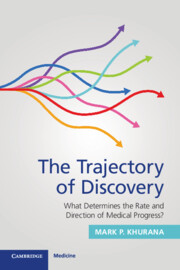Book contents
- The Trajectory of Discovery
- Reviews
- The Trajectory of Discovery
- Copyright page
- Dedication
- Contents
- Figures
- Acknowledgments
- Introduction
- Section 1 Incentives, Context, and Capital
- Section 2 The Financial Determinants of Discovery
- Chapter 7 The Research Marketplace
- Chapter 8 Winners Take All
- Chapter 9 Public Service
- Chapter 10 The Medici Model
- Chapter 11 The Goldilocks Zone
- Chapter 12 Kindling Creativity
- Section 3 Bending the Arc
- Section 4 Reflecting on the Trajectory
- References
- Index
Chapter 10 - The Medici Model
How Does Philanthropy Influence the Rate and Direction of Progress?
from Section 2 - The Financial Determinants of Discovery
Published online by Cambridge University Press: 06 April 2023
- The Trajectory of Discovery
- Reviews
- The Trajectory of Discovery
- Copyright page
- Dedication
- Contents
- Figures
- Acknowledgments
- Introduction
- Section 1 Incentives, Context, and Capital
- Section 2 The Financial Determinants of Discovery
- Chapter 7 The Research Marketplace
- Chapter 8 Winners Take All
- Chapter 9 Public Service
- Chapter 10 The Medici Model
- Chapter 11 The Goldilocks Zone
- Chapter 12 Kindling Creativity
- Section 3 Bending the Arc
- Section 4 Reflecting on the Trajectory
- References
- Index
Summary
The Medici family, through commercial and business ventures, attained considerable wealth and political sway in thirteenth century Florence. They also initiated the concept of patronage, providing sums of money to scientists to pursue their research; in fact, science philanthropy in the modern day resembles this Medici-esque patronage structure. Philanthropy can positively impact the research community, in part due to the flexibility of the funding structure it provides as well as the lack of political influence compared to public funding. They also have the flexibility to test new funding mechanisms that public funding bodies can later adopt, such as supporting individuals and not projects - in a way serving as a funding R&D project for future funding initiatives. However, the direction of research may also be skewed by vested interests from foundations and donors - as well as having other potentially negative downstream effects on the rate of progress. This chapter explores the complex role of philanthropy in setting the rate and direction of medical progress and provides solutions on how to improve their impact.
- Type
- Chapter
- Information
- The Trajectory of DiscoveryWhat Determines the Rate and Direction of Medical Progress?, pp. 56 - 60Publisher: Cambridge University PressPrint publication year: 2023

